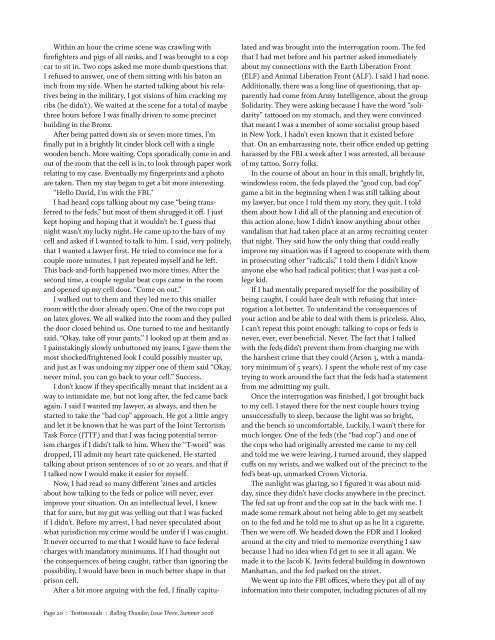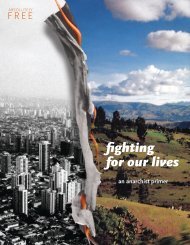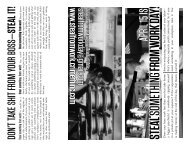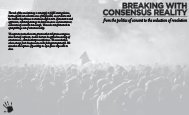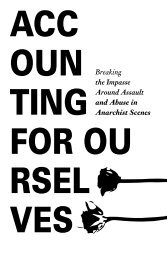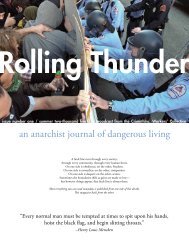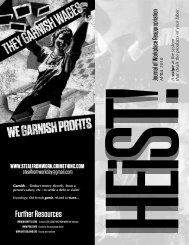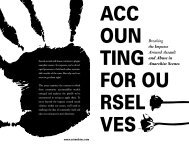Rolling Thunder - CrimethInc
Rolling Thunder - CrimethInc
Rolling Thunder - CrimethInc
Create successful ePaper yourself
Turn your PDF publications into a flip-book with our unique Google optimized e-Paper software.
Within an hour the crime scene was crawling withfirefighters and pigs of all ranks, and I was brought to a copcar to sit in. Two cops asked me more dumb questions thatI refused to answer, one of them sitting with his baton aninch from my side. When he started talking about his relativesbeing in the military, I got visions of him cracking myribs (he didn’t). We waited at the scene for a total of maybethree hours before I was finally driven to some precinctbuilding in the Bronx.After being patted down six or seven more times, I’mfinally put in a brightly lit cinder block cell with a singlewooden bench. More waiting. Cops sporadically come in andout of the room that the cell is in, to look through paper workrelating to my case. Eventually my fingerprints and a photoare taken. Then my stay began to get a bit more interesting.“Hello David, I’m with the FBI.”I had heard cops talking about my case “being transferredto the feds,” but most of them shrugged it o≠. I justkept hoping and hoping that it wouldn’t be. I guess thatnight wasn’t my lucky night. He came up to the bars of mycell and asked if I wanted to talk to him. I said, very politely,that I wanted a lawyer first. He tried to convince me for acouple more minutes, I just repeated myself and he left.This back-and-forth happened two more times. After thesecond time, a couple regular beat cops came in the roomand opened up my cell door. “Come on out.”I walked out to them and they led me to this smallerroom with the door already open. One of the two cops puton latex gloves. We all walked into the room and they pulledthe door closed behind us. One turned to me and hesitantlysaid, “Okay, take o≠ your pants.” I looked up at them and asI painstakingly slowly unbuttoned my jeans, I gave them themost shocked/frightened look I could possibly muster up,and just as I was undoing my zipper one of them said “Okay,never mind, you can go back to your cell.” Success.I don’t know if they specifically meant that incident as away to intimidate me, but not long after, the fed came backagain. I said I wanted my lawyer, as always, and then hestarted to take the “bad cop” approach. He got a little angryand let it be known that he was part of the Joint TerrorismTask Force (JTTF) and that I was facing potential terrorismcharges if I didn’t talk to him. When the “T-word” wasdropped, I’ll admit my heart rate quickened. He startedtalking about prison sentences of 10 or 20 years, and that ifI talked now I would make it easier for myself.Now, I had read so many di≠erent ’zines and articlesabout how talking to the feds or police will never, everimprove your situation. On an intellectual level, I knewthat for sure, but my gut was yelling out that I was fuckedif I didn’t. Before my arrest, I had never speculated aboutwhat jurisdiction my crime would be under if I was caught.It never occurred to me that I would have to face federalcharges with mandatory minimums. If I had thought outthe consequences of being caught, rather than ignoring thepossibility, I would have been in much better shape in thatprison cell.After a bit more arguing with the fed, I finally capitulatedand was brought into the interrogation room. The fedthat I had met before and his partner asked immediatelyabout my connections with the Earth Liberation Front(ELF) and Animal Liberation Front (ALF). I said I had none.Additionally, there was a long line of questioning, that apparentlyhad come from Army Intelligence, about the groupSolidarity. They were asking because I have the word “solidarity”tattooed on my stomach, and they were convincedthat meant I was a member of some socialist group basedin New York. I hadn’t even known that it existed beforethat. On an embarrassing note, their o∞ce ended up gettingharassed by the FBI a week after I was arrested, all becauseof my tattoo. Sorry folks.In the course of about an hour in this small, brightly lit,windowless room, the feds played the “good cop, bad cop”game a bit in the beginning when I was still talking aboutmy lawyer, but once I told them my story, they quit. I toldthem about how I did all of the planning and execution ofthis action alone, how I didn’t know anything about othervandalism that had taken place at an army recruiting centerthat night. They said how the only thing that could reallyimprove my situation was if I agreed to cooperate with themin prosecuting other “radicals.” I told them I didn’t knowanyone else who had radical politics; that I was just a collegekid.If I had mentally prepared myself for the possibility ofbeing caught, I could have dealt with refusing that interrogationa lot better. To understand the consequences ofyour action and be able to deal with them is priceless. Also,I can’t repeat this point enough: talking to cops or feds isnever, ever, ever beneficial. Never. The fact that I talkedwith the feds didn’t prevent them from charging me withthe harshest crime that they could (Arson 3, with a mandatoryminimum of 5 years). I spent the whole rest of my casetrying to work around the fact that the feds had a statementfrom me admitting my guilt.Once the interrogation was finished, I got brought backto my cell. I stayed there for the next couple hours tryingunsuccessfully to sleep, because the light was so bright,and the bench so uncomfortable. Luckily, I wasn’t there formuch longer. One of the feds (the “bad cop”) and one ofthe cops who had originally arrested me came to my celland told me we were leaving. I turned around, they slappedcu≠s on my wrists, and we walked out of the precinct to thefed’s beat-up, unmarked Crown Victoria.The sunlight was glaring, so I figured it was about midday,since they didn’t have clocks anywhere in the precinct.The fed sat up front and the cop sat in the back with me. Imade some remark about not being able to get my seatbelton to the fed and he told me to shut up as he lit a cigarette.Then we were o≠. We headed down the FDR and I lookedaround at the city and tried to memorize everything I sawbecause I had no idea when I’d get to see it all again. Wemade it to the Jacob K. Javits federal building in downtownManhattan, and the fed parked on the street.We went up into the FBI o∞ces, where they put all of myinformation into their computer, including pictures of all mytattoos. It was sort of funny making up explanations for them,like my answer regarding the meaning of my tattoo of a manthrowing a book with a fuse coming out of it at the FederalReserve building: “It means knowledge is power.” Right.After going through the FBI’s o∞ces, I was given to theUS Marshals and brought to their separate o∞ces to be putinto more computers. All of this took a few hours, with allof the waiting handcu≠ed to chairs. It was incredibly disorienting,considering I was never told what was going tohappen next or where I was or what time it was. In fact, Isuddenly found myself handcu≠ed to a chair in this hallwaywhere I was to meet with a lawyer minutes before seeing ajudge.Following my brief meeting with the attorney, I appearedbefore a federal judge. The prosecution asked for bail to beset at $250,000 and my jaw dropped (I didn’t realize youonly had to put up 10% of that amount). My lawyer counteredwith something significantly less, and it ended upbeing set at $150,000. The Legal Aid lawyer I was assignedwas really sweet, so when I turned to him and asked “Whatnow?” he put a hand on my shoulder and said really softlythat I had to go to prison for that night. I was quickly ledaway by the marshals after that.I was moved from cell to cell for the next few hours,neurotically thinking about the di≠erent paths my life couldhave taken, imagining myself as a typical college studentjust “playing the game” as my dad always called it. Thethought of how stupid it was not to have a lookout oftencame up. It was frightening, but more because I had no ideawhat to expect. That’s why the procedures for moving prisonersaround are made to maximize the feelings of anxietythat stem from not knowing what’s coming next. It makesyou feel really powerless.I ended up in a cell with a group of maybe eight men,most in their mid-twenties, all people of color. We were allin shackles, our hands and feet cu≠ed with a chain connectingthe two sets. No one looked angry or upset, even,just exhausted. They all had that weary look in their eye,like they were looking at something in the distance. No onetalked. A few people looked at the half-sleeve tattoo I haveon my right arm and gave me a half a nod. Then a couple ofmarshals came and led us to a van with bars on the windowsthat I found out later would be taking us to the MetropolitanDetention Center in Brooklyn.Pulling up to the jail was pretty ominous, given it wasthe middle of winter, night, and there were high walls allaround us with spotlights shining down. Moving in ourshackles, we were led into more cold holding cells withother people waiting. This whole experience is about waiting.Then moving somewhere else to wait some more. Overand over again. In one of the first waiting rooms, I wasstripped down, had my anus examined, and was given a tan,ill-fitting, itchy jumpsuit and the cheapest shoes I’ve everseen. They then gave us the choice of donating our clothesto the prison, or sending them home. I laughed when theytold me this, and said that they weren’t getting my clothes.No longer in shackles, me and a bunch of other guyswere moved around some more, given ID cards with ournumbers on them, and then finally led up to the cell blockswhere we’d be staying. While I was waiting before we gotthere, some guys in the cell talked to me a bit, I thinkbecause I was one of the youngest guys there. They kind ofreassured me and said that I should just try not to cry, andI’d do okay. I managed to do exactly that until I got to thecell I was assigned to. The other guy in the cell was alreadyasleep on the bottom bunk, so I awkwardly climbed ontothe top bunk, buried my head in my pillow, and bawleduntil I fell asleep.Early in the morning, my cellmate woke me to tell meit was time for a count. He was my age, maybe even a yearyounger, and seemed as unsure about the whole experienceas I did. We both stood by the small window of our cell dooras we waited for the guard to come by and make sure wehadn’t escaped. Then it was time for breakfast. I asked mycellmate if I actually had to go and he shook his head, so Ijust went back to sleep. Lunch came and I woke up, lookedaround, and went to sleep again.As dinner rolled around, I found that no matter howhard I tried I could not sleep a single second longer. I managedto rouse myself, jump down and use the toothbrushthat I’d been given the night before. I finally saw the cell,and it was sparse. A toilet, sink, tiny window, bunk beds andtwo small lockers giving not much in the way of comfort.I ventured out into the main hall. It was a big, openspace with tables that had the food serving area on the left,a basketball court in a connected room, and circling threequarters of the room were two tiers of cells with two staircasesleading from the top tier to the floor. When I came outof my cell, there was a line of inmates snaking around theroom waiting for dinner. I jumped in line and once I got tothe food realized that the only vegan options were corn andwhite rice, neither known for their nutritional value. Nomatter, I didn’t have that much of an appetite anyway, afterthinking about my legal predicament.With little else to do after finishing, I pulled up a chair infront of the two televisions, and read the subtitles that werescrolling below. I was dying for something more substantialto read but there was nothing in sight. The whole time I satthere, I was hoping my name was going to be called to tellme I had been bailed out. I had my lawyer’s business cardwith me, so I kept leaving messages on the legal aid voicemailservice asking him what was going on with my case,even though he couldn’t have responded.As I was watching TV, I heard somebody calling “Heyyou” in my direction, and when I looked up I saw this guybeckoning me over. A little hesitant, I got up and sat downat a table with him and three other guys. They all had beenlooking at the tattoo on my arm and wanted to see it upclose. All of them were impressed, and started talking abouttheir tattoos. When they got around to asking me what Iwas in for, I told them that I was accused of setting fire toan Army Recruitment center. They all started cracking up.“Yo, why’d you get your crime tattooed on your arm?” Icouldn’t help but laugh.Page 20 : Testimonials : <strong>Rolling</strong> <strong>Thunder</strong>, Issue Three, Summer 2006<strong>Rolling</strong> <strong>Thunder</strong>, Issue Three, Summer 2006 : Testimonials : Page 21


